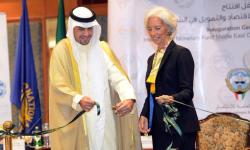
Typical street scene in Santa Ana, El Salvador. (Photo: iStock)
IMF Survey : IMF and Kuwait Officially Open Mideast Training Center
October 29, 2014
- Center is funded, supported by Kuwait, trains officials from the whole region
- It aims to strengthen the implementation of sound economic policies
- Training emphasizes hands-on learning, adapts to meet the needs of the region
IMF Managing Director Christine Lagarde and Kuwait’s Minister of Finance Anas Al-Saleh officially inaugurated the IMF Middle East Center for Economics and Finance (CEF) in Kuwait following an endorsement from the parliament.

IMF Chief Christine Lagarde joins Kuwait’s Minister of Finance Anas Al-Saleh in cutting the ribbon that symbolized the official inauguration of the IMF Middle East training center in Kuwait City (photo: IMF)
KUWAIT TRAINING CENTER
The CEF—a premier training center in the region—is hosted and fully financed by the state of Kuwait. It started operations in late 2011 and was officially ratified by the National Assembly in June 2014. A steering committee, comprising the IMF and Kuwaiti representatives, oversees the work of the center.
Since inception, the center has offered about 120 activities, and provided training to more than 3,600 officials from the 22 countries of the Arab League. Gulf Cooperation Council (GCC) countries have benefited especially from the establishment of the center, with over 1,100 officials having been trained, including 350 from Kuwait alone, says the IMF.
The IMF chief, who unveiled the center on October 25 in presence of the finance ministers and central bank governors of all GCC countries, praised the financial and logistical support of the Kuwaiti government, especially the Kuwait Investment Authority (KIA).
“We appreciate the Kuwaiti authorities’ generous support of the CEF and the Fund’s technical assistance initiatives in the region,” said Lagarde. “The establishment of the Center has allowed us to better meet the training needs of the Arab world at a crucial juncture as many countries face a historic social and economic transition—it will help us build a brighter future together,” she added.
Training as vital part of IMF work
The IMF is better known for lending to countries in times of need and crisis, and for conducting annual check-ups of individual and regional economies and financial systems, known as surveillance or policy consultations. But, some people may not be aware that the global institution also runs four regional training centers around the world, including the CEF.
“Capacity building—both training and technical assistance—has been a sort of middle child; it doesn’t get the attention of the oldest and youngest children, yet in many ways is the glue that holds the family together,” Lagarde told reporters in Kuwait.
By opening the CEF in Kuwait, the Fund adds one more training hub to its global chain of training centers and programs. These global centers offer hands-on, policy-oriented training in macroeconomics, finance, and related operational fields, says the IMF.
The 188-member institution stressed that the focus of its training around regional centers allows for better tailoring of the particular needs of a region, closer coordination with other training providers, and enhanced ability to respond quickly to emerging needs.
Role of the new center
The IMF noted that CEF’s mission is to deliver the highest quality training to officials from Arab League member countries to help them acquire the skills to formulate and implement sound economic policies, to respond to the critical policy issues of the day, and to achieve macroeconomic stability and sustained inclusive growth.
The IMF is the principal training provider for the CEF in the area of macroeconomic and financial management. Training outside the core areas of expertise of the Fund is delivered by organizations such as the Organization for Economic Cooperation and Development (OECD), the World Bank, and the World Trade Organization (WTO). Much of the training is in Arabic, or interpreted simultaneously to Arabic, the IMF says.
“Beyond the core courses in macroeconomics and finance, we now offer courses on energy subsidy reform, inclusive growth, Islamic banking, macroeconomic management in resource-rich countries, and macroprudential policies,” said Sharmini Coorey, Director of the IMF’s Institute for Capacity Development. “Our training has a strong policy orientation and we use country cases drawn from the region to illustrate ways of dealing with economic challenges under a practical learning environment,” she added.
As part of CEF’s outreach in the region, the center also partners with the Arab Monetary Fund to conduct training activities in Abu Dhabi. The center also hosts high-level events and outreach activities, including for parliamentarians, journalists, and prominent local institutions. For instance, the CEF co-organized last May a high-level conference on “Economic Development, Diversification, and the Role of the State in the GCC countries.” The forum brought together international experts, high-level policymakers from the region, and renowned academics to shed light on successful diversification strategies, drawing on international experience and that of some countries in the region.


